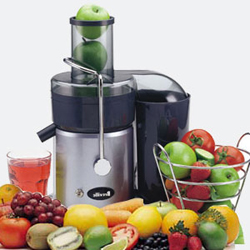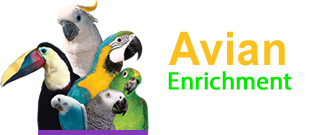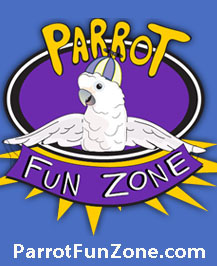 The juice of fresh fruits and vegetables is the richest available food source of vitamins, minerals, and enzymes. There is a miracle of energy supplied by live plants that comes from nothing else on our planet. Parrots are biologically adapted to assimilate their vitamins, minerals, and enzymes from live plants. The juice of these plants is the equivalent of a vitamin/mineral/enzyme cocktail that parrots consider a treat! Juicing for Parrots
The juice of fresh fruits and vegetables is the richest available food source of vitamins, minerals, and enzymes. There is a miracle of energy supplied by live plants that comes from nothing else on our planet. Parrots are biologically adapted to assimilate their vitamins, minerals, and enzymes from live plants. The juice of these plants is the equivalent of a vitamin/mineral/enzyme cocktail that parrots consider a treat! Juicing for Parrots
Because juicing removes the fiber, the important nutrients and phytochemicals found in plants are easily absorbed with little effort on the part of the digestive system. Fruit and vegetable juices provide a convenient source of enzymes. Enzymes are extremely important to health because they spark the essential chemical reactions that are necessary to life. Enzymes are required for digesting food, for stimulating the brain, for providing cellular energy, and for repairing all tissue.
Americans, it seems, really enjoy their juice. In fact, juice bars are becoming so popular that Entrepreneur magazine recently ranked them among the hottest business trends of the coming year. Enjoying juice at home with the help of a juicing machine can be a fun and easy way to get a concentrate of many of the vitamins, minerals and other nutrients that we and our parrots need in our daily diet. Fresh juice provides these nutrients in a tasty liquid from a live food rather than from a laboratory-created pill.
Dr. Dave McCluggage, a highly respected holistic veterinarian of Colorado, juices different combinations of health-giving fruits and vegetables for his parrot family, as well as for his human family. He recommends selecting a parrot's favorite fruit or vegetable for juicing. He says that apples are always a good choice for juicing, and he also recommends carrots, kale, spinach and other healthful fruits and vegetables. Dr. McCluggage said that although fiber is an important component of a parrot's diet, juice concentrates many nutrients in a tasty liquid that parrots easily can consume by drinking. He suggested offering the remaining pulp or fibrous leftovers from the juicing process in a separate dish or baked into birdie bread. Any remaining pulp can be used as an excellent composting material.
Fruits are the edible structure of flowering plants, or more specifically, the mature ovary of the plant. Nutritionally, they are loaded with vitamins, minerals, and enzymes. Some fruits contain protein and fats as well. Citrus fruits and berries also are rich in bioflavonoids. Vegetables are herbaceous plants that can be eaten whole or in part. This can include the tubers, roots, leaves, seeds, and flowering parts of the plant. They are composed primarily of water, and they are rich sources of many essential vitamins and minerals.
Parrots enjoy the many tastes, textures, and colors of whole fruits and vegetables. Juices of whole live foods should not be used as a substitute for fresh foods but rather as a supplemental source of vitamins and minerals. Most parrots cannot eat enough raw foods daily to get optimal levels of valuable nutrients, partially because our foods are grown in poor soils that have been stripped of their vitality by overuse. Add to this the problem of long-term storage of produce before it reaches the market place, and the nutrient content can be significantly lessened.
When using commercially prepared vitamin and mineral supplements, we easily can overdose parrots and negatively impact their sensitively balanced systems. The adverse effects can manifest themselves in a number of ways including overstimulation, nervousness, aggression, feather plucking, and even organ damage. By offering a highly concentrated but natural source of vitamins, minerals, and enzymes, we can circumvent the problem of overdosing parrots with laboratory-created nutrients.
The most significant difference between whole produce and the juice of fresh fruits and vegetables is that juicing eliminates the fiber--the indigestible part. Juicing makes the food easier to digest and assimilate. There are some ready-prepared juices available, but when you make your own, you know exactly what it contains. There will be no danger of added sugar or artificial sweeteners, preservatives, or other additives. Most commercially prepared juices are heat-treated to extend shelf life, which destroys valuable nutrients in the process. In addition to ensuring maximum nutrition, juicing allows you to be creative. You can make all kinds of taste-tempting combinations for your birds.
It is easy to make fresh healthful juices for your parrots and for yourself. You need only high-quality produce and a good juicer. There are many types of juicers available. I have an Acme brand juicer that is just as good today as when I bought it twenty years ago. A good juicer is an investment and not necessarily inexpensive. If you search the internet, you will find a wealth of information on all types of juicers which you can match to your particular needs. If you would like to try juicing before you invest in a juicer, use a small amount of water in a blender and pulverize and strain the fruits and vegetables.
If possible, buy organic produce--fruits and vegetables that have been grown without the use of pesticides or other harmful chemicals. Otherwise, avoid the most contaminated produce. See a safe and unsafe list here: Parrots, Produce and Pesticides. Conventionally grown tropical fruits should be peeled to remove the pesticide sprays which still are legal for use in many of the countries where they are grown.
Buy only the amount of produce that you will use in a few days' time, preferably no more than a week's worth, to prevent spoilage. Thoroughly wash your produce before juicing. Use a vegetable brush to remove any residue and waxes. You may also want to use a vegetable wash or a Citricidal product such as Nutribiotic or Agrisept which can be found in most health food stores. After thoroughly washing the produce, remove the skins of apricots, grapefruits, oranges, papaya, peaches, and pineapples. As a rule, leave small seeds in the fruits except for apple seeds. Remove all pits of apples before juicing in order to avoid the small amount of cyanide in them. You can leave most stems and leaves intact when juicing. However, rhubarb greens must be removed because they contain toxic substances. Cut the produce into pieces small enough for the feeding hatch on your juicer. To make leafy green vegetable juices such as kale, rapini, collard, spinach, mustard, and turnip greens more palatable, mix them with flavorful juices such as carrot or apple. All juices can be flavored with liquid concentrates of cherry or cranberry juices from health food stores. They should be added sparingly after juicing.
To serve fresh fruit and vegetable juices to your birds, it can be offered by hand in a small cup if you have only a few birds. If you have a flock of parrots, making individual hand servings impractical, it can be served by soaking dry foods in the juice. Bird bread, pellets, dry cereals such as shredded wheat squares, and other dry foods can be soaked in the fresh juice and given to parrots. Small amounts of fresh juice from organic produce are a healthful addition to baby parrot formula. Ideally, fresh juice should be consumed immediately after juicing, but leftovers can be stored briefly in the refrigerator in a glass container with an airtight lid or frozen in ice cube trays for later use. Some of the nutrients are lost in freezing, but it still is a tasty and healthful food.
As you experiment with juicing, you will discover the combinations of fruits and vegetables that please the palate of your birds and yourself. A good first juice might be a combination of four or five carrots, one half apple (without seeds), and a quarter-inch slice of ginger. The mainstay produce of juicing are carrots, apples, green foods, and beets. When juicing greens, garlic, broccoli, and other hard to handle foods, push them through the hopper of the juicer with carrots. Small pieces of dense produce such as garlic can be wrapped in the leafy greens such as kale for easier handling.
You haven't really tasted apple juice until you taste it fresh from your juicer. Since it contains a lot of natural sugar, it usually is combined with vegetables such as carrots, celery, spinach and others. This is a close tie with carrot juice as the favorite of parrots. All sweet fruits should be used sparingly as flavoring for other healthful juices. Juices contain simple sugars that we need for energy; however, because they are combined with other healthful nutrients, they are not harmful, as are refined sugars. Parrots that are prone to obesity, such as amazons, should not be allowed unlimited juice. As healthful as it is, it is not a low calorie food.
Perhaps it is due to the bright orange color and the fresh sweet taste, but for whatever reason, parrots love carrot juice. Fresh carrots are a tasty food containing many important nutrients. The body converts beta carotene into Vitamin A, which is important in strengthening the immune system and promoting healthy cell growth. Not only is it a precursor of vitamin A, it is a powerful antioxidant which neutralizes toxins in the system. A hefty ninety percent of the beta carotene of carrots is absorbed when carrots are juiced. Carrots also contain the recently discovered alpha carotene which is thought to be a powerful inhibitor of tumor growth. One carrot, seven inches long and one inch in diameter, yields the following nutrients: 27 mg. Calcium, 26 mg. Phosphorus, 0.5 mg. iron, 34 mg. Sodium, 246 mg. potassium , 7,930 I.U. vitamin A, trace amounts of B-complex vitamins, 6 mg. vitamin C, magnesium and chromium.
The American Journal of Clinical Nutrition reported in their October 1985 issue that "Carrot juice pulls heavy metals from tissues, binds them and discharges them from the body's system." Parrots are subject to heavy metal toxicity from a variety of sources, from the cookware that we use for food preparation, the water they drink, the air they breathe, and especially the pesticide-sprayed leafy greens that they eat, so the use of carrot juice as a chelating agent could be very important to their health.
There is a wonderful side benefit to juicing for your parrots. It is no more trouble to make enough juice for yourself and your family than to make a small portion for your birds. Unless you are eating three fourths of your diet raw, your own health will improve dramatically with the daily consumption of raw fruit and vegetable juices.
Parrots that regularly consume fresh fruit and vegetable juices have an unmistakable sheen to their feathers and shine in their eyes that let you know you are doing something right!
Here are some other foods that can be juiced to benefit specific conditions that affect parrots: (Always use spinach and parsley sparingly for parrots.)
Arthritis
- broccoli and kale--sources of pantothenic acid
- kale, parsley and spinach--sources of vitamin C
- spinach and carrot--sources of vitamin E
- carrot, ginger root, apple--sources of copper
- cherry and blueberry--sources of bioflavonoids
- pineapple--the only source of bromelain
Calcium Deficiency
- kale, mustard greens, carrots, kohlrabi, watercress, cabbage, turnip and beet tops
Candidiasis
- kale, spinach and turnip greens--sources of vitamin B-6
- red Swiss chard, turnip, garlic, and radish--sources of selenium
- parsley, beet greens, dandelion greens, and broccoli--sources of organic iron
Cancer Protection
beet juice--contains the sulphur amino acids and the sulphur-sugar complex known as betanin
Cataracts
- carrot, kale, parsley and spinach--sources of beta-carotene
- garlic--a juiceable source of vitamin B1
- spinach, currant, asparagus, broccoli, Brussel sprouts--sources of vitamin B2
- kale, parsley, green pepper and broccoli--sources of vitamin C
- spinach asparagus and carrot--sources of vitamin E
- red Swiss chard, turnip, garlic, and orange--sources of selenium
- carrot, garlic, and ginger root--sources of copper
- spinach, turnip greens, beet greens, and carrot--sources of manganese
- ginger root, parsley, garlic and carrot--sources of zinc
Feather, Skin and Nail Health
- parsnips--to improve taste, prepare with apple or carrot juice.
Fungal Infections
- garlic--rich in sulfur and potassium, kills fungus, bacteria, and intestinal parasites, and should be used sparingly for parrots. Juice with carrots and ginger for improved flavor.
Gout
- kale, beet greens, and broccoli--sources of folic acid
- kale, parsley, sweet pepper, and strawberry--sources of vitamin C
- pineapple--the only source of bromelain
- green vegetables--sources of omega-3 fatty acids
- cherry and strawberry--help to neutralize uric acid (remove cherry pits before juicing)
Infections
- blueberry and black currant--contain antibacterial agents
- grape, apple, and cabbage--contain antiviral and antibacterial compounds
- garlic--the most potent natural antibiotic
- pineapple--fresh juice contains enzyme bromelain, anti-inflammatory agent
- celery, carrot, and Swiss chard--contain high amounts of potassium and sodium
- ginger, parsley, and carrot--sources of zinc
- kale, red pepper, and collard greens--low-sugar* sources of vitamin C
- tomato, cabbage, and sweet pepper--low-sugar*sources of bioflavonoids
- carrot, kale, and spinach--low-sugar* sources of beta-carotene
- (Note: It is important not to use high-sugar foods when parrots have any type of infections.)
Liver Toxicity
- dandelion greens--best diluted with carrot juice.
- tomato--season juice with lemon juice or cayenne pepper, a favorite of parrots.
- carrot--juice is excellent liver cleanser
Metal Toxicity
- potato juice--According to Science Magazine, November 8, 1985, potatoes are an excellent source of simple peptides called "phytochelatins", useful in the removal of toxic heavy metals from the system.
- carrot juice, green peas, cabbage, tomato, cranberries. According to The American Journal of Clinical
- Nutrition, October 1985, these and other unspecified "fresh fruits" can pull heavy metals from fatty tissues where they reside, bind them and discharge them from the system.
Motion Sickness
- ginger--studies at Brigham Young University found ginger to be more effective than Dramamine.
- kale and spinach--sources of vitamin B-6
- sweet pepper, kale strawberry--sources of vitamin C
- turnip greens, broccoli, and lettuce--sources of vitamin K
Pain Relief
- chili peppers--Another favorite of parrots, the capsicum of hot peppers is now commercially prepared as a topical pain reliever, available in health food stores as a roll-on preparation and in capsule form. Dilute the juice of hot peppers in carrot juice to aid in pain relief of parrots following injury or surgery.
Sinus Problems
- kohlrabi--(member of the cabbage family) Add pineapple juice for flavor and improved assimilation.
Skin Disorders
- celery--source of calcium, phosphorus, potassium, vitamin A and B complex vitamins
- cucumber--source of calcium, phosphorus, potassium, vitamins A,B,C, magnesium, boron and chlorine
- beets--good source of sulphurs needed for healthy skin but should be used sparingly for parrots
- red grapes--seeds may be juiced too
Stress
- broccoli and kale--sources of pantothenic acid
- red pepper, kale, and collard greens--sources of vitamin C
- ginger, parsley, and carrot--sources of zinc
- collard greens and parsley--excellent sources of magnesium
- parsley, Swiss chard and spinach--sources of potassium
- carrot, collard greens and parsley--excellent sources of beta-carotene
Thyroid
- radishes and leafy tops--Raphanin (sulfur component) balances production of thyroxin.
Tonic
- wheat grass and barley grass--powerful chlorophyll-rich foods to be given parrots in very small doses
- cayenne--the most powerful and prolonged natural stimulant known.
Vision
- carrot juice--This richest source of vitamin A and carotenoids strengthens eyes and preserves vision.
- passion fruit--Peel and scoop out seeds before juicing.
*************
Carolyn Swicegood has written many excellent articles on the topics of avian diet, nutrition and health many of which can be found on her highly recommended website www.landofvos.com



















































































































































Comments powered by CComment